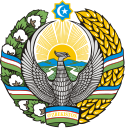|
Government of Uzbekistan
The Government of the Republic of Uzbekistan (Uzbek: O'zbekiston Respublikasining Hukumati, Uzbek Cyrillic: Узбекистон Республикасининг Ҳукумати) exercises executive power in the Republic of Uzbekistan. The members of the government are the President of Uzbekistan, Prime Minister of Uzbekistan, Ministers, and Deputy Ministers.[1] It has its legal basis in the Constitution of Uzbekistan. The Cabinet of Ministers of the Government of the Republic of Uzbekistan is the executive power body of the Republic of Uzbekistan, ensuring guidance over effective functioning of the economy, social and cultural development, execution of the laws, and other decisions of the Oliy Majlis, the Uzbek parliament, as well as decrees and resolutions issued by the President of the Republic of Uzbekistan. The Cabinet The Cabinet of Ministers consists of the Prime Minister of the Republic of Uzbekistan, his deputies, ministers, and chairmen of state committees. The head of the government of the Republic of Karakalpakstan is part of the Cabinet of Ministers by virtue of his position. The composition of the Cabinet of Ministers is formed by the President of the Republic of Uzbekistan. The candidate for the Prime Minister of the Republic of Uzbekistan is considered and approved by the Chambers of the Oliy Majlis of the Republic of Uzbekistan based on the presentation of the President of the Republic of Uzbekistan. Members of the Cabinet of Ministers are approved by the President of the Republic of Uzbekistan upon the submission of the Prime Minister of the Republic of Uzbekistan. The Prime Minister of the Republic of Uzbekistan organizes and directs the activities of the Cabinet of Ministers, is personally responsible for its effective operation, presides over meetings of the Cabinet of Ministers, and signs its decisions. The Cabinet of Ministers has the right of legislative initiative. The President of the Republic of Uzbekistan has the right to make decisions on issues within the competence of the Cabinet of Ministers, preside over its meetings, cancel the decisions and orders of the Cabinet of Ministers and orders of the Prime Minister. The Cabinet of Ministers is responsible in its activities to the President of the Republic of Uzbekistan and the Oliy Majlis of the Republic of Uzbekistan. The Cabinet of Ministers assumes its powers in the same manner as the newly elected Oliy Majlis. The procedure for organizing the activities of the Cabinet of Ministers is defined in the Regulations of the Cabinet of Ministers approved by the decision of the Cabinet of Ministers of the Republic of Uzbekistan No. 62 dated February 14, 2005. The work of the Cabinet of Ministers is carried out according to quarterly plans. At the meetings of the Cabinet of Ministers, the most important issues of state administration, economy and socio-cultural development are resolved. Meetings of the Cabinet of Ministers are held at least once every quarter of the year. The Presidium of the Cabinet, consisting of the Prime Minister and his deputies, functions as a permanent body of the Cabinet of Ministers. According to the Prime Minister's decision, other members of the Government of the Republic of Uzbekistan may be included in the Cabinet of Ministers. Extraordinary meetings of the Cabinet of Ministers and its Presidium may be held when there is a need to discuss urgent issues. Every week, the Prime Minister of the Republic of Uzbekistan holds councils with the participation of the Deputy Prime Minister, the Head of the Information and Analytical Department and the Head of the Apparatus, where the issues of organizing the execution of the tasks of the President of the Republic of Uzbekistan, the daily activities of the government apparatus are discussed. The Cabinet of Ministers issues decisions and orders that must be implemented by all bodies, enterprises, institutions, organizations, officials and citizens in the entire territory of the Republic of Uzbekistan in aby current legislation. Provisional commissions of the Cabinet of Ministers and other working bodies may be established to prepare proposals on some issues of state and economic management, develop draft decisions of the Cabinet of Ministers, as well as to carry out some tasks of the Cabinet of Ministers. Cabinet
The Republic of Uzbekistan is a presidential constitutional republic, whereby the President of Uzbekistan is both head of state and head of government. Executive power is exercised by the government. Legislative power is vested in the two chambers of the Supreme Assembly, the Senate and the Legislative Chamber. The judicial branch (or judiciary), is composed of the Supreme Court, Constitutional Court, and Higher Economic Court that exercises judicial power. The movement toward economic reform in Uzbekistan has not been matched by movement toward political reform. The government of Uzbekistan has instead tightened its grip since independence (September 1, 1991), cracking down increasingly on opposition groups. Although the names have changed, the institutions of government remain similar to those that existed before the breakup of the Soviet Union. The government has justified its restraint of public assembly, opposition parties, and the media by emphasizing the need for stability and a gradual approach to change during the transitional period, citing the conflict and chaos in the other former republics (most convincingly, neighboring Tajikistan). This approach has found credence among a large share of Uzbekistan's population, although such a position may not be sustainable in the long run. Despite the trappings of institutional change, the first years of independence saw more resistance than acceptance of the institutional changes required for democratic reform to take hold. Whatever initial movement toward democracy existed in Uzbekistan in the early days of independence seems to have been overcome by the inertia of the remaining Soviet-style strong centralized leadership. References
|
|||||||||||||||||||||||||||||||||||||||||||||||||||||||||||||||||||||||||||||||||||||||||||||||||||||||||||||||||||||||||||||||||||||||||||||||||||||||||||||||||||||||||||||||||||||||||||||||||||||||||||||||||||||||||

